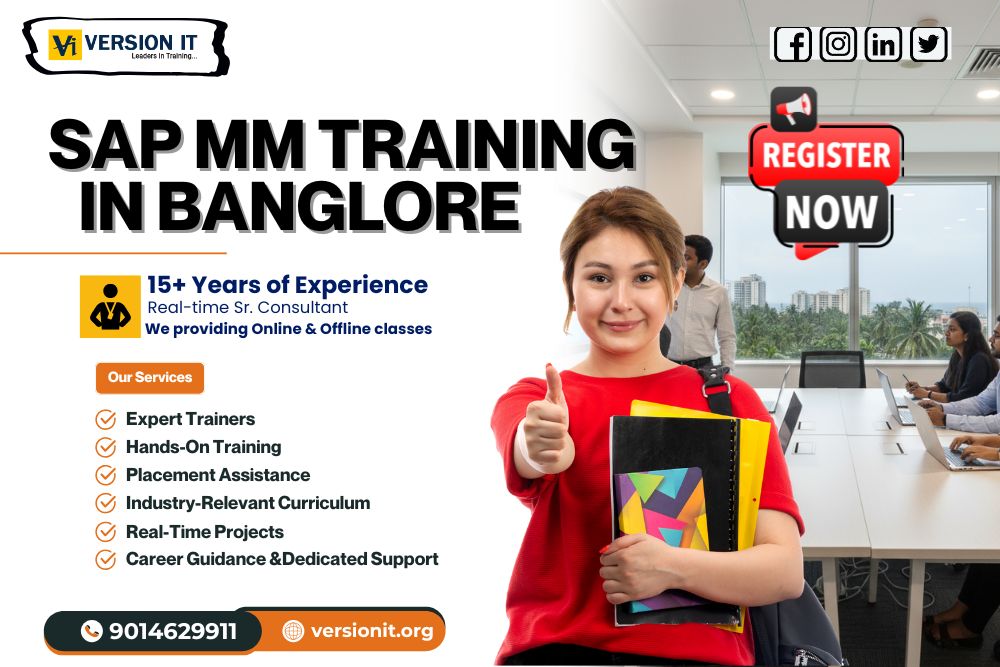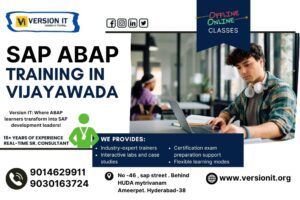Introduction
Procurement and supply chain management are undergoing rapid transformation. Rising complexities in global sourcing, demand variability, technology disruptions, and customer expectations are pushing organizations to adopt smarter systems. Among those, SAP’s Materials Management (MM) module stands out as a foundational pillar for modern enterprise resource planning (ERP). Training in SAP MM doesn’t just equip individuals—it helps organizations respond to change with agility, efficiency, and strategic insight.
What is SAP MM, and what does its training cover
SAP MM governs materials, procurement, inventory, vendor management, invoice verification, and stock control among other functions. It is tightly integrated with modules like Production Planning (PP), Sales & Distribution (SD), and Finance (FI/CO), making it central to end-to-end supply chain flows.
Effective SAP MM training typically covers:
- Material master & vendor master data setup
- Procurement processes (purchase requisitions, orders, contracts)
- Inventory management (goods receipt, issue, transfers)
- Invoice verification & GR/IR clearing
- Valuation, account determination, stock control
- Integration with S/4HANA and other emerging technologies
This combination of process knowledge, configuration skills, and hands-on exposure is what gives the trained professional an edge.
Trends in procurement and supply chain that SAP MM training addresses
Here are some of the key changes in procurement/supply chain landscapes and how SAP MM Training helps shape responses:
- Digital transformation & automation: Companies are automating repetitive procurement tasks (e.g., requisition creation, purchase order approval, invoice matching) to reduce time, errors, and manual intervention. SAP MM supports many of these automation features. Training helps people understand how to configure and use them.
- Real-time visibility and analytics: Supply chains need data in near real-time—on inventory levels, supplier performance, lead times, demand signals. The newer versions of SAP MM in the SAP S/4HANA environment and its integrations provide richer analytics, dashboards, and live tracking. Training in these areas ensures supply chain professionals can harness those tools.
- Integration across modules: Procurement doesn’t happen in isolation. Material planning, production, sales, invoicing, finance—all are interlinked. SAP MM is often the glue. Formal training shows how flows across MM-PP-SD-FI work, how to avoid bottlenecks, and how to reduce silos.
- Emerging technologies (AI, ML, IoT, Cloud): Predictive analytics helps forecast demand. IoT sensors help monitor stock and logistics. Cloud platforms provide flexibility and scalability. These are increasingly integrated with SAP’s newer offerings. SAP MM Training programs that include these elements prepare professionals for future roles.
- Sustainability, compliance, supplier risk: As regulatory requirements increase and consumers demand sustainable sourcing, companies need accurate, auditable, and transparent procurement processes. SAP MM with its source lists, vendor evaluation, tracking, and auditing features helps in this. Training helps in configuring and using such features properly.
How SAP MM Training in Bangalore plays a critical role
Bangalore is one of India’s tech hubs. Here’s why SAP MM Training in Bangalore (offline or online) becomes especially significant:
- High demand for SAP MM skills: Many enterprises, big and small, in Karnataka and nearby states implement SAP or move to S/4HANA. Trained MM professionals are needed for implementation, support, optimization, and continuous improvement.
- Access to good training institutes: In Bangalore there are institutes that offer SAP MM courses with updated curriculum, hands-on labs, industry case studies, even placement support. These help learners not only gain theoretical knowledge but apply it. YKP Technologies is one example.
- Blended / flexible learning models: Institutes offering SAP MM Training in Bangalore increasingly provide online or hybrid models. This flexibility helps working professionals. Version IT, though based in Hyderabad, conducts online SAP MM Training Institute in Bangalore for those who can’t travel, blending interactive sessions, practical labs, real-case scenarios.
- Alignment with industry knowledge: Good training programs in Bangalore incorporate current SAP trends—S/4HANA, cloud migration, AI/ML, integration, best practices in vendor management. This keeps learners relevant.
Role and strengths of Version IT as a Training Institute
When considering training providers, Version IT has certain advantages which illustrate how well-designed training can shape the future of procurement/supply chain roles:
- Updated curriculum: Version IT ensures its SAP MM program is aligned with current SAP S/4HANA changes and industry standards. It covers both traditional ECC and S/4HANA environments.
- Experienced trainers: Trainers at Version IT often have real hands-on experience from companies using SAP MM. This brings practical issues and problem solving into the classroom, which is essential when real-world procurement challenges don’t always go by the book.
- Flexibility & interactivity: They offer online lectures + live interaction, Q&A, recorded sessions, real-case exercises. For many learners (especially in Bangalore), this means balancing work, study, travel constraints become easier.
- Placement assistance & real-project exposure: Graduates from Version IT’s SAP MM courses have found roles in major companies—as consultants, functional analysts, procurement specialists. Exposure to sample scenarios, labs, simulated real-company tasks helps bridge the gap from theory to work.
- Good reputation & commitment to student growth: Testimonials from students of Version IT mention respectful, responsive faculty; support in clearing doubts; and help in placements. This matters, because training + support tends to produce professionals who can contribute more quickly.
How SAP MM Training shapes the future of procurement & supply chain
Putting together the above, here are concrete ways how SAP MM training (especially in places like Bangalore, and via institutes like Version IT) is helping shape the future:
- Faster, more accurate procurement cycles: With trained staff, procurement requests, approvals, goods receipt, invoice verification are processed more quickly and with fewer errors. This reduces delays, bottlenecks, redundant paperwork.
- Cost optimization: Proper configuration (e.g., through source list, contracts, vendor evaluation) helps negotiate better with suppliers; reducing overstock or understock saves inventory carrying costs; avoiding duplicate or erroneous vendor payments.
- Supply chain agility & resilience: When professionals understand real-time inventory, vendor lead times, integration with demand planning, businesses can respond more flexibly to sudden disruptions—e.g., supply delays, demand spikes, global disruptions.
- Data-driven decision-making: Rather than relying on manual reports, lagging indicators, training in modern SAP MM environments equips professionals to use dashboards, analytics, alerts. This helps in forecasting, supplier risk assessment, cost-benefit analysis, sustainability metrics.
- Technological adoption and innovation: Training prepares professionals to work with newer features—cloud-enabled SAP systems, integrations with IoT for tracking, AI/ML for predictive procurement, sustainability metrics. The future supply chain will be more tech-heavy; those without exposure may lag.
- Cross-functional collaboration: Since SAP MM is integrated with other areas (finance, production, procurement, sales), trained MM professionals can help break down silos. This leads to better end-to-end alignment: inventory planning matches demand forecasts; purchasing aligns with financial goals; production gets materials when needed; vendors are managed proactively.
- Career growth & roles diversification: For individuals, the training opens roles like SAP MM consultant, materials planner, procurement analyst, supply chain functional lead. For companies, having in-house skill reduces dependency on external consultants, leads to better internal capability.
Conclusion
In summary, SAP MM Training is more than just learning a module—it’s about enabling procurement and supply chain functions to become more efficient, resilient, and strategic. In Bangalore, owing to the strong IT infrastructure, institutional options, and industry demand, SAP MM Course in Bangalore offers significant opportunity for professionals and companies alike.
Institutes like Version IT illustrate how good training programs—those with updated curriculum, hands-on exposure, industry-relevant cases, and strong support—play a crucial role in preparing the workforce for future challenges in supply chain and procurement.
For businesses, investing in SAP MM training means better process optimization, cost savings, risk mitigation, and agility. For individuals, it means more career options, relevance in a changing world, and ability to contribute meaningfully to modern supply chains.




